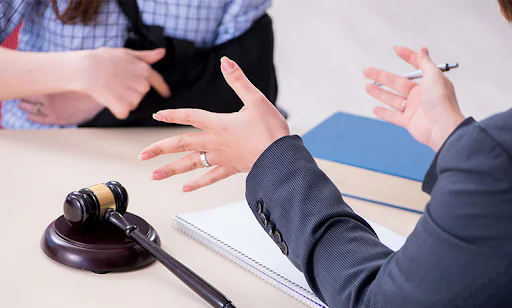As any car accident can be both physically and emotionally distressful, being involved can be both terrifying and alarming. Emotions will run high; many may become upset; panic may ensue – however the following steps must always be considered following an incident.

Well, no matter whether it was a simple tap or a complicated crash, it’s crucial to know what to do after a car accident and this is what this guide will look at.
Stay Calm and Ensure Safety
The first important step that any driver should take after an accident is to avoid panicking. Pressure or anger cannot help but escalate the situation or cloud judgement to useful decision making. Emergencies occur and sometimes one may be on the wrong end and this may feel intimidating but a clear head is required to address the issue.
In the event that one is able, the driver in the accident should pull over the car or truck to the side of the road, lane or a less busy area to avoid causing more traffic and congestion on the same. Activate your hazard lights to let the other motorists know that there is a problem. If one cannot self-evacuate, do not attempt to; stay put, especially if there are still cars going around your car in traffic, and wait for help.
Check for Injuries
Check around the scene to confirm that there is no danger to you or your passengers then proceed to assess everyone for injuries. Even if you do not feel pain, there could be discomfort due to adrenaline rush as a result of the car accident, and should take your time in evaluating situation keenly. Even if a person has a slight injury, if someone thinks that an emergency exists, they should immediately call 911.
This is particularly relevant not only for the treatment of trauma but also for documentation of the occurrence of the accident. Sometimes, the extent of damage may take time to manifest themselves and you or the other party may be uncomfortable initially but later develop symptoms of whiplash or concussion.
Call Law Enforcement
Usually, it is mandatory to call the police in case of a major accident or if anyone is hurt. A police officer will come to the scene to record the accident and they will prepare an official report which is important in such cases of accidents regarding insurance. In interacting with the officer, the emphasis should be kept on facts only. Do not increase details or apologize, as this is not the time to decide who was at fault.
Exchange Information
Share contact details with the other parties that were involved in the accident. All this should be done in a professional manner and without panicking. Provide your name, phone number, date of the incident and license number. Consequently, collect their information also. It is imperative to share the insurance policy numbers as well as the relevant insurance company contacts. One must ensure that he or she appears polite and willing to engage in this exchange.
Document the Scene
It is advisable to take pictures of the scene before the police arrive or after offering your statement or vice versa. This can help in the future in the event of an insurance claim or in the event of an argument as to what led to the accident. Take photographs of all the vehicles involved and make sure you take pictures from different vantage points of the damage.
Do not forget to photograph the tire skids, traffic signs and signals or any other things that could have led to the accident. Also, capture a picture or more of the visible injuries if any.
Notify Your Insurance Company
it is advisable to inform your insurance company soon as you can. All policies have a provision that you should inform your insurer, and failing to do so will make your claim process hard, or your claim may be denied.
When you give details to the insurance representative just like when you report the case to the insurance company, avoid taking responsibility. Avoid spreading rumors and let the investigating authorities rule out the blame. It is always recommended to provide an early notice to your insurance company so that the claims retrieval process can begin immediately.
Understand Your Insurance Coverage
It is crucial to know the details of the insurance plan after the incident, especially if several cars were involved. As you’ll find out, your policy has various forms and each of them has a part to play when it comes to the payout of your damages. The third-party liability policy looks at compensation for the other car and medical bills where you are deemed to be responsible. Collision coverage will assist in covering damage to your own car regardless of fault.
FAQs
What Happens After a Car Accident That Is Your Fault?
If a car accident is your responsibility, several consequences could follow. First and foremost, notify your insurance provider as soon as possible so they can investigate to ascertain liability and manage any claims against you.
In states that utilize a “fault” system, your policy might also cover damage to other parties’ vehicles as well as medical costs up to your policy limits.
How to Get Over a Car Accident That Was Your Fault
Recovery after an auto accident that was your responsibility can be difficult. Guilt, anxiety and even fear about driving again are normal reactions; to begin healing emotionally from such an event it’s important to acknowledge these feelings rather than suppressing them.
Seeking support from friends, family or therapist can assist in processing them in an appropriate manner while taking appropriate actions such as insurance and legal responsibilities can restore control back.
How Long Do You Have to Go to the Hospital After a Car Accident?
Unfortunately, there’s no absolute rule that specifies when or why someone needs to visit a hospital following a car accident, but seeking immediate medical assistance is always advised.
Even if you feel fine after the collision, internal injuries might not manifest immediately. For that reason alone it is recommended that individuals seek medical advice 24 to 72 hours post-accident to assess any possible injuries and seek proper treatment as soon as possible.
How Long After a Car Accident Do You Have to Go to the Hospital?
Medical experts advise seeking medical assistance within 24-72 hours following a car accident, even if injuries seem minor.
Whiplash and internal bleeding might not show immediate symptoms. But early diagnosis is essential in order to avoid complications and minimize further injuries.
Conclusion
Learning what steps to take after being at fault can be a stressful experience, but knowing which ones will make the experience less daunting. From remaining calm and assuring safety measures are in place to contacting your insurer for compensation claims; every action plays an integral part in safeguarding yourself legally and financially.











